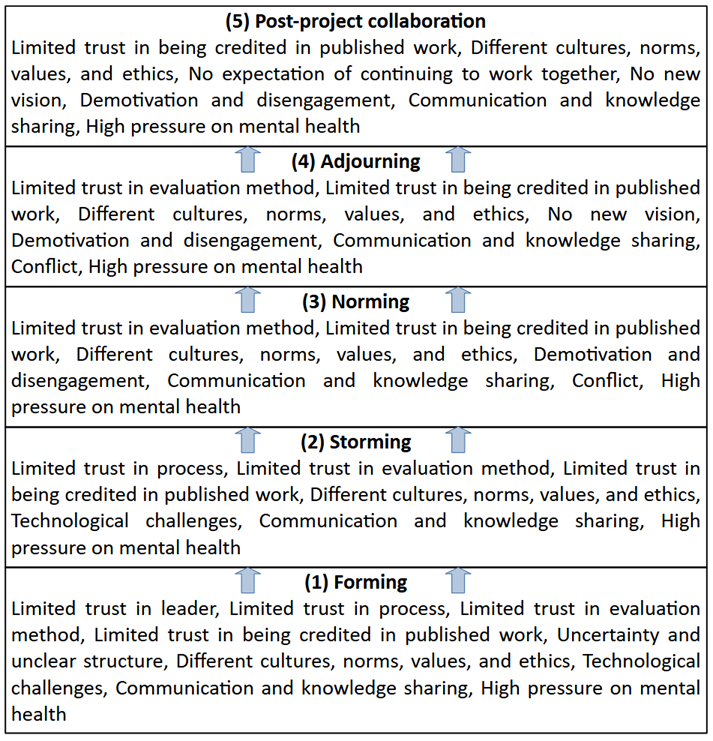
Building trust to support researchers’ mental health
You may also like
Taking part in a project brings many benefits for researchers, but less documented are the challenges that can create cumulative negative effects on academics’ mental health. Each stage of a project brings different challenges to trust for researchers, as this study has identified. When the leader of a project knows the typical challenges to trust that researchers might face, they will understand what to aim to mitigate at each stage.
Researchers often face additional challenges beyond their research. For example, they may have to move regularly to work on a new project because of the short contracts offered. They are often in a new town or foreign country with a different culture and language. Researchers’ heavy reliance on technology means that learning how to use new software can delay their progress and reduce their productivity.
- Research shouldn’t cause trauma – let’s find a better way
- Researchers need support to change the world – here’s how to provide it
- How to build trust as a research supervisor
Within the project team itself, building a team requires building trust, but researchers must also wait and hope that they are credited for the research output.
These disparate challenges put pressure on researchers’ mental health and cause anxiety.
Five stages of a research project
Previous research has focused on four stages of a project: forming, storming, norming and adjourning. Our research adds a fifth stage: post-project collaboration. This stage is an implicit or explicit part of most research projects. For example, a postdoctoral researcher expects to be credited for their work even if it is published in a journal years after the end of the project.
Post-project collaboration is important in the context of research. For universities and researchers alike, long-term sustainable networks are vital. The money spent on research is often in hope that beyond the project’s immediate goals being achieved, a network or ecosystems will also be triggered.
The challenges at each of the five stages are identified in the table below. This enables the leader to focus on a manageable number of challenges at each stage. Some challenges are in only one stage of the process, while others occur across multiple stages. Conflict is not a challenge at the start, but establishing trust is. This suggests that low trust at the start causes problems later; it is a delayed reaction. Once the conflict happens, it might be too late, so the trust should be built early.

Trust is important in several collaboration settings, particularly at the start, until participants familiarise themselves with each other and the project team matures. In research teams, because of the long time until the research is published, often more than three years, an additional, long-term cause for risk and distrust can arise that is resolved only once the research is published.
Challenges to trust at each of the five stages
At the first stage, where the team is formed, trust should be built to cover four topics: trust in the leader, process, evaluation method, and trust in being credited in published work. If the leader builds the researchers’ trust in them at the start, they free up time to focus on other challenges in the second stage of the project. The other challenges present at the first stage, such as trust in the evaluation method, may be difficult to resolve completely at the first stage, but they can be reduced at each stage as far as possible.
At the third stage, norming, new challenges usually emerge as people may start to run out of the goodwill they had at the start, and they may stop giving the benefit of the doubt when they disagree. Demotivation, disengagement and conflict often start to come out. If a foundation of trust in relation to the other challenges has been built at the earlier stages, the challenges in the third stage will be easier to overcome.
In the final two stages of the project, adjourning and post-project collaboration, a new vision needs to be communicated effectively as the original vision will stop resonating after the norming stage. Without a follow-up project on the horizon, another shared vision of collaborating in the future could be built.
For those challenges that cannot be solved outright, the leader of the research project must show an awareness of them and what effect they can have. The leader should be ambidextrous, in the sense of focusing on the project deliverables and the socio-psychological aspects of research teamwork. Meeting the project goals and building trust in the team is a more sustainable approach to research projects.
Alex Zarifis is a lecturer in information systems at the University of Southampton, UK.
If you would like advice and insight from academics and university staff delivered direct to your inbox each week, sign up for the Campus newsletter.




